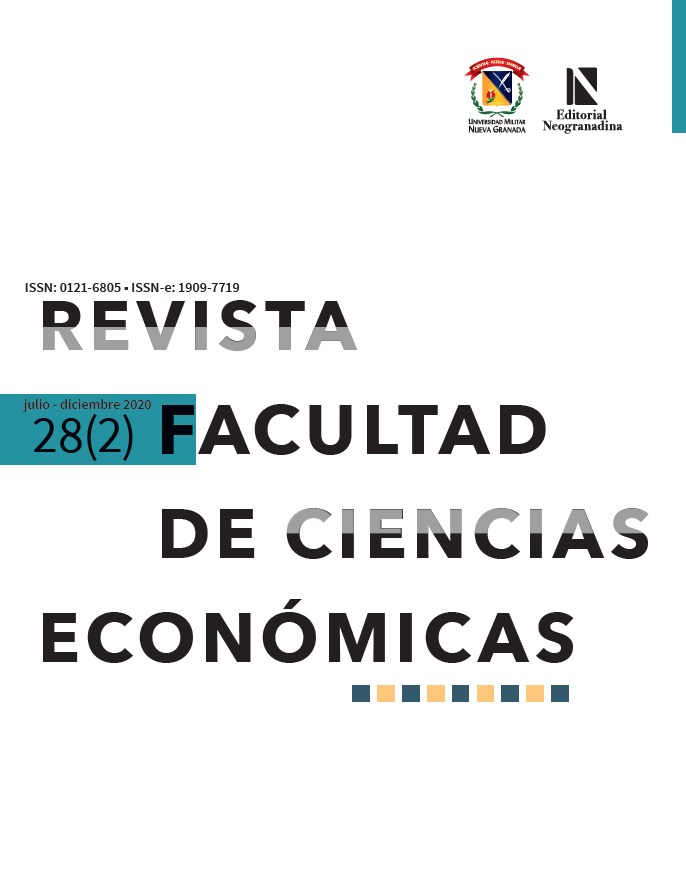Environmental, Social, and Governance Performance
Impact on Financial Performance in the Latin American Context
Abstract
This article intends to study the relationship between environmental, social, and governance performance (ESG) and financial performance in companies in emerging Latin American economies based mainly on agency theory, resource-based theory, and stakeholder theory. For this, a sample of companies from the primary Latin American stock indices in 2013-2017 was taken using panel data analysis. The results suggest a positive relationship between ESG variables and financial performance, implying companies’ motivation to adopt good corporate social responsibility (CSR) practices since they are well rewarded financially. The environmental component suggests the potential for improvement by Latin American companies. This study also provides inputs to the study of esg performance in Latin America that are of interest to regulators, companies, scholars, and professionals for being a region of tremendous natural wealth that demands coordination of all agents to advance at the business level and as a society and achieve more balanced development between financial and non-financial factors.
Downloads
References
Aboud, A. y Diab, A. (2016). The financial and market consequences of environmental, social and governance ratings. The implications of recent political volatility in Egypt. Sustainability Accounting, Management and Policy Journal, 10(3), 498-520. doi: https://doi.org/10.1108/SAMPJ-06-2018-0167
Amini, C. y Dal Bianco, S. (2017). Corporate social responsibility and Latin American firm performance. Corporate Governance (Bingley), 17(3), 403-445. doi: https://doi.org/10.1108/CG-03-2016-0060
Atan, R., Alam, M. M., Said, J. y Zamri, M. (2018). The impacts of environmental, social, and governance factors on firm performance. Panel study of Malaysian companies. Management of Environmental Quality: An International Journal, 29(2), 182-194. doi: https://doi.org/10.1108/meq-03-2017-0033
Baah, C., Opoku-agyeman, D., Abdel, F. y Abdoulaye, M. (2020). Understanding the influence of environmental production practices on firm performance: a proactive versus reactive approach. Journal of Manufacturing Technology Management. doi: https://doi.org/10.1108/JMTM-05-2020-0195
Bendickson, J., Muldoon, J., Liguori, E. y Davis, P. E. (2016a). Agency theory: the times, they are a-changin’. Management Decision, 54(1), 174-193. doi: https://doi.org/10.1108/MD-02-2015-0058
Bendickson, J., Muldoon, J., Liguori, E. W. y Davis, P. E. (2016b). Agency theory: background and epistemology. Journal of Management History, 22(4), 437-449. doi: https://doi.org/10.1108/JMH-06-2016-0028
Cabeça-Serapicos, A. J., Mendes-Leite, J. y Odete-Fernandes, P. (2019). Agency theory approach of the relationship between performance, compensation and value creation in the companies listed on Euronext Lisbon. Contaduría y Administración, 64(3), 1-19. doi: https://doi.org/10.22201/fca.24488410e.2018.1693
Cochran, P. L. y Wood, R. A. (1984). Corporate social responsibility and financial performance. Academy of Management Journal, 27(1), 42-56. doi: https://doi.org/10.5465/255956
Correa-García, J. A., Hernández-Espinal, M. C., Vásquez-Arango, L. y Soto-Restrepo, Y. M. (2016). Reportes integrados y generación de valor en empresas colombianas incluidas en el Índice de Sostenibilidad Dow Jones. Cuadernos de Contabilidad, 17(43). doi: https://doi.org/10.11144/javeriana.cc17-43.rigv
Correa, D. y Hernández, P. (2017). Informes de sostenibilidad y su impacto en la creación de valor financiero en las empresas. Contaduría Universidad de Antioquia, 70, 43-61.
Correa-Mejía, D. A., Reyes-Naranjo, D. C. y Montoya-Beltrán, K. M. (2018). La información no financiera y el desempeño financiero empresarial. Semestre Económico, 21(46), 185-202. doi: https://doi.org/10.22395/seec.v21n46a8
Escobar-Váquiro, N., Benavides-Franco, J. y Perafán-Peña, H. F. (2017). Gobierno corporativo y desempeño financiero: conceptos teóricos y evidencia empírica. Cuadernos de Contabilidad, 17(43), 203-254. doi: https://doi.org/10.11144/javeriana.cc17-43.gcdf
Fama, E. F. (1980). Agency problems and the theory of the firm. Journal of Political Economy, 88(2), 288-307. Recuperado de https://www.jstor.org/stable/1837292
Fatemi, A., Glaum, M. y Kaiser, S. (2018). esg performance and firm value: the moderating role of disclosure. Global Finance Journal, 38, 45-64. doi: https://doi.org/10.1016/j.gfj.2017.03.001
Freeman, R. E. (1984). Strategic management: a stakeholder approach. Cambridge University Press. doi: https://doi.org/10.2139/ssrn.263511
Freeman, R. E. y Reed, D. L. (1983). Stockholders and stakeholders: a new perspective on corporate governance. California Management Review, 25(3), 88-106. doi: https://doi.org/10.2307/41165018
Friede, G., Busch, T. y Bassen, A. (2015). esg and financial performance: aggregated evidence from more than 2000 empirical studies. Journal of Sustainable Finance and Investment, 5(4), 210-233. doi: https://doi.org/10.1080/20430795.2015.1118917
Fuentes-Doria, D. D., Toscano-Hernández, A. E., Díaz-Ballesteros, J. L. y Escudero-Garrido, Y. (2019). Ética y sostenibilidad en la gestión contable: un análisis documental en el contexto mundial en los periodos 2009-2018. Contaduría Universidad de Antioquia, 75, 43-67. doi: https://doi.org/10.17533/udea.rc.n75a02
Galant, M. (2017). The stakeholders theory as a starting point for the critique of corporate social responsibility. Prace Naukowe Uniwersytetu Ekonomicznego We Wrocławiu, 464, 31-42. doi: https://doi.org/10.15611/pn.2017.464.03
Gray, R., Kouhy, R. y Lavers, S. (1995). Corporate social and longitudinal study of uk disclosure. Accounting, Auditing & Accountability Journal, 8(2), 47-77.
Habek, P. y Wolniak, R. (2016). Assessing the quality of corporate social responsibility reports: the case of reporting practices in selected European Union member states. Quality & Quantity, 50(1), 399-420. doi: https://doi.org/10.1007/s11135-014-0155-z
Haller, A., Link, M. y Groß, T. (2017). The term “non-financial information”. A semantic analysis of a key feature of current and future corporate reporting. Accounting in Europe, 14(3), 407-429. doi: https://doi.org/10.1080/17449480.2017.1374548
Hasan, I., Kobeissi, N., Liu, L. y Wang, H. (2018). Corporate social responsibility and firm financial performance: the mediating role of productivity. Journal of Business Ethics, 149(3), 671-688. doi: https://doi.org/10.1007/s10551-016-3066-1
Hernández-Lalinde, J., Espinosa-Castro, J., Peñaloza-Tarazona, M., Fernández-González, J., Chacón-Rangel, J., Toloza-Sierra, C., … y Bermúdez-Pirela, V. (2018). Sobre el uso adecuado del coeficiente de correlación de Pearson: definición, propiedades y suposiciones. avft-Archivos Venezolanos de Farmacología y Terapéutica, 37(5).
Husted, B. W. y de Sousa-Filho, J. M. (2019). Board structure and environmental, social, and governance disclosure in Latin America. Journal of Business Research, 102, 220-227. doi: https://doi.org/10.1016/j.jbusres.2018.01.017
Jaén, M. H., Auletta, N., Bruni Celli, J. y Pocaterra, M. (2018). Bibliometric analysis of indexed research on corporate social responsibility in Latin America (2000-2017). Academia Revista Latinoamericana de Administracion, 31(1). doi: https://doi.org/10.1108/ARLA-06-2017-0190
Jones, T. M., Harrison, J. S. y Felps, W. (2018). How applying instrumental stakeholder theory can provide sustainable competitive advantage. Academy of Management Review, 43(3), 371-391. doi: https://doi.org/10.5465/amr.2016.0111
Lima-Crisóstomo, V., Souza Freire, F. y Cortes de Vasconcellos, F. (2011). Corporate social responsibility, firm value and financial performance in Brazil. Social Responsibility Journal, 7(2), 295-309. doi: https://doi.org/10.1108/17471111111141549
Lopez, B. y Fornes, G. (2015). Corporate social responsibility in emerging markets: case studies of Spanish mncs in Latin America. European Business Review, 27(2), 214-230. doi: https://doi.org/10.1108/EBR-03-2013-0053
Madorran, C. y García, T. (2016). Corporate social responsibility and financial performance: the Spanish case. Revista de Administração de Empresas, 56(1), 20-28.
Mallin, C., Farag, H. y Ow-Yong, K. (2014). Corporate social responsibility and financial performance in Islamic banks. Journal of Economic Behavior and Organization, 103, S21-S38. doi: https://doi.org/10.1016/j.jebo.2014.03.001
Martínez-Ferrero, J. y Frías-Aceituno, J. V. (2015). Relationship between sustainable development and financial performance: international empirical research. Business Strategy and the Environment, 24(1), 20-39. doi: https://doi.org/10.1002/bse.1803
McGuire, J. B., Sundgren, A. y Schneeweis, T. (1988). Corporate social responsibility and firm financial performance. Academy of Management Journal, 31(4), 854-872. doi: https://doi.org/10.5465/256342
Miras, M. del M., Carrasco, A. y Escobar, B. (2014). Responsabilidad social corporativa y rendimiento financiero: un meta-análisis. Revista Española de Financiación y Contabilidad, 43(2), 193-215. doi: https://doi.org/10.1080/02102412.2014.911000
Mondragón, M. (2000). Uso de la correlación de Spearman en un estudio de intervención en fisioterapia. Movimiento Científico, 8(1), 98-104. Recuperado de https://dialnet.unirioja.es/servlet/articulo?codigo=5156978
Murillo, D. R. (2007). La competitividad exportadora de los sectores ambientalmente sensibles y la construcción de un patrón exportador sostenible en América Latina y el Caribe. Documentos de Proyectos Cepal, 148, 1-221. Recuperado de http://www.eclac.cl/publicaciones/xml/1/32231/LCW148.pdf
Newey, W. y Stouli, S. (2020). Control variables, discrete instruments, and identification of structural functions. Journal of Econometrics. doi: https://doi.org/10.1016/j.jeconom.2020.07.027
Ortas, E., Álvarez, I. y Garayar, A. (2015). The environmental, social, governance, and financial performance effects on companies that adopt the United Nations Global Compact. Sustainability, 7(2), 1932-1956. doi: https://doi.org/10.3390/su7021932
Penrose, E. (1959). The theory of the growth of the firm. Nueva York: Oxford University Press.
Porter, M. E. y Kramer, M. R. (2011). La creación de valor compartido. Harvard Business Review. América Latina, 89, 3-18. Recuperado de http://www.pacificrubiales.com.co/juntosconstruyendo/wwwroot/pdf/SharedValueinSpanish.pdf
Pulido, B. (2010). Teoría de los recursos y capacidades el foco estratégico centrado en el interior de la organización. Sotavento mba, 15, 54-60.
Rodríguez-Fernández, M. (2016). Social responsibility and financial performance: the role of good corporate governance. brq Business Research Quarterly, 19(2), 137-151. doi: https://doi.org/10.1016/j.brq.2015.08.001
Rupley, K. H., Brown, D. y Marshall, S. (2017). Evolution of corporate reporting: from stand-alone corporate social responsibility reporting to integrated reporting. Research in Accounting Regulation, 29(2), 172-176. doi: https://doi.org/10.1016/j.racreg.2017.09.010
Saeidi, S. P., Sofian, S., Saeidi, P., Saeidi, S. P. y Saaeidi, S. A. (2015). How does corporate social responsibility contribute to firm financial performance? The mediating role of competitive advantage, reputation, and customer satisfaction. Journal of Business Research, 68(2), 341-350. doi: https://doi.org/10.1016/j.jbusres.2014.06.024
Saini, N. y Singhania, M. (2019). Performance relevance of environmental and social disclosures. The role of foreign ownership. Benchmarking: An International Journal, 26(6). doi: https://doi.org/10.1108/bij-04-2018-0114
Sanches-Garcia, A., Mendes-Da-Silva, W. y Orsato, R. J. (2017). Sensitive industries produce better esg performance: evidence from emerging markets. Journal of Cleaner Production, 150, 135-147. doi: https://doi.org/10.1016/j.jclepro.2017.02.180
Sánchez-Peñaflor, S. y Herrera-Avilés, M. (2016). Los recursos humanos bajo el enfoque de la teoría de los recursos y capacidades. Revista Facultad de Ciencias Económicas, 24(2), 133-146. doi: https://doi.org/10.18359/rfce.2216
Seixas-Pinto, L. J., De Souza-Freire, F. y Costa dos Santos, M. A. (2016). Retorno das ações com status de reputação corporativa no Brasil : um estudo comparativo entre empresas ranqueadas no Merco e empresas listadas no ise bm & f Bovespa. Revista de Auditoria Governanca e Contabilidade, 4(9), 57-75.
Sikacz, H. y Wołczek, P. (2019). esg analysis of companies included in the Respect Index based on Thomson Reuters Eikon database. Prace Naukowe Uniwersytetu Ekonomicznego We Wrocławiu, 520, 115-127. doi: https://doi.org/10.15611/pn.2018.520.10
Velte, P. (2017). Does esg performance have an impact on financial performance? Evidence from Germany. Journal of Global Responsibility, 8(2), 169-178. doi: https://doi.org/10.1108/jgr-11-2016-0029
Venturelli, A., Cosma, S. y Leopizzi, R. (2018). Stakeholder engagement: an evaluation of european banks. Corporate Social Responsibility and Environmental Management. doi: https://doi.org/10.1002/csr.1486
World Business Council for Sustainable Development [wbcsd]. (2019). Reporting matters. Navigating the landscape: a path forward for sustainability reporting. Recuperado de https://docs.wbcsd.org/2019/10/WBCSD_Reporting_Matters_2019.pdf











